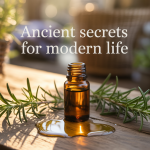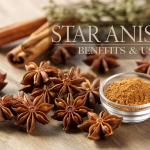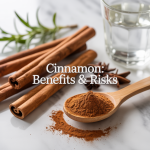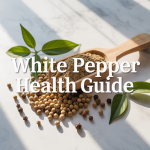Eucalyptus tea has gained popularity as a natural remedy for respiratory issues and overall wellness. This herbal tea, made from the leaves of eucalyptus trees, offers both therapeutic benefits and potential risks that everyone should know about before adding it to their routine.
This guide is perfect for health-conscious individuals, herbal tea enthusiasts, and anyone curious about natural wellness alternatives. You’ll discover the science-backed health benefits of eucalyptus tea, from respiratory support to anti-inflammatory properties. We’ll also cover important safety considerations and potential side effects you need to watch out for. Finally, you’ll learn practical preparation methods and creative ways to use eucalyptus beyond just drinking it as tea.
Understanding Eucalyptus Tea and Its Origins
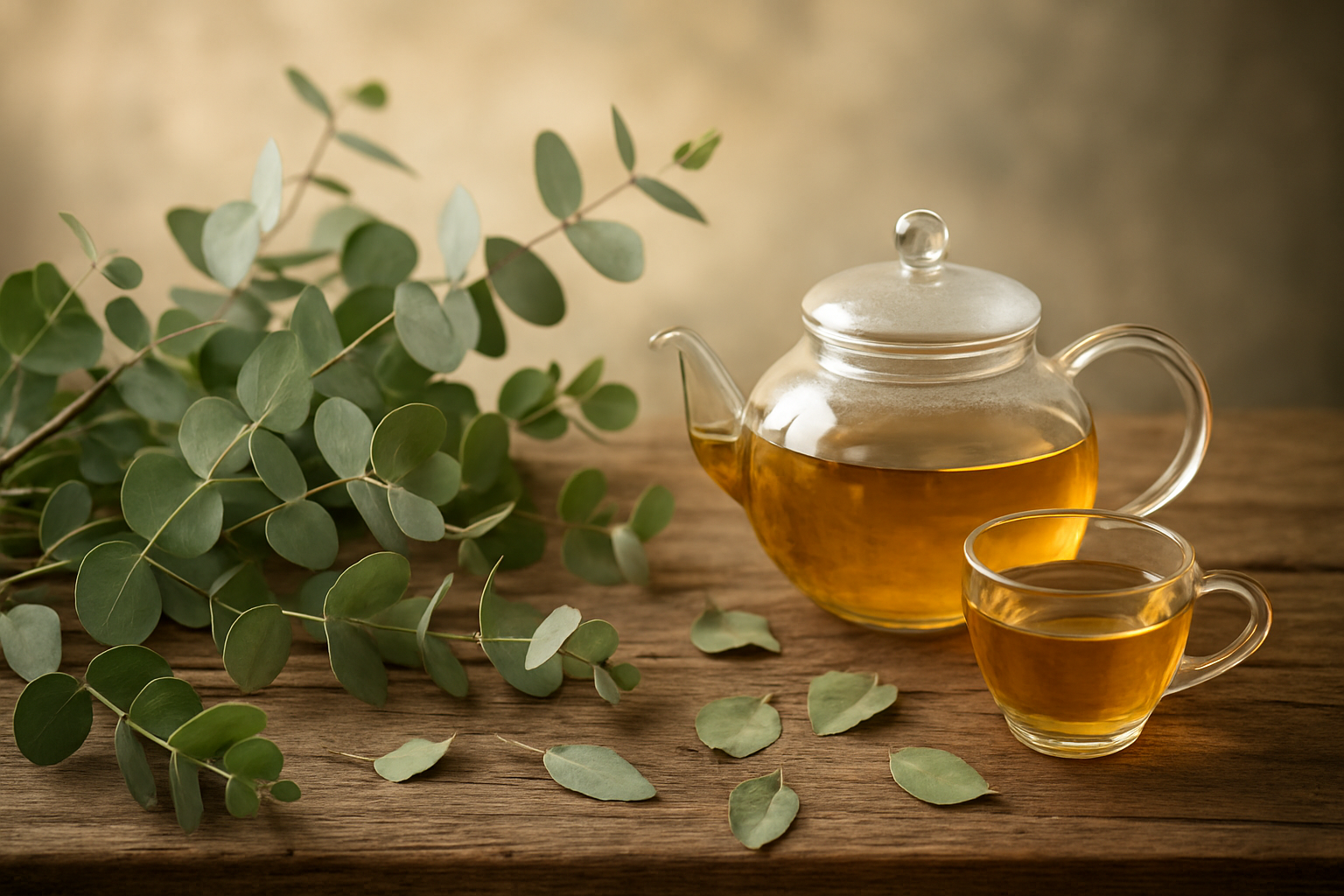
What Makes Eucalyptus Tea Unique Among Herbal Teas
Eucalyptus tea stands apart from other herbal teas thanks to its distinctive cooling sensation and intensely aromatic profile. The tea’s signature menthol-like taste comes from eucalyptol, a powerful compound that creates that refreshing feeling when you breathe in the steam. Unlike chamomile’s gentle floral notes or peppermint’s sweet sharpness, eucalyptus delivers a clean, almost medicinal flavor that’s immediately recognizable.
What really sets this tea apart is its dual nature as both a beverage and therapeutic remedy. While most herbal teas focus primarily on taste and mild wellness benefits, eucalyptus tea packs a more potent punch. The essential oils present in the leaves create an experience that’s as much about aromatherapy as it is about drinking.
The leaves themselves tell an interesting story. Eucalyptus trees produce oils as a natural defense mechanism against insects and diseases, making the tea naturally antimicrobial. This evolutionary adaptation translates into a beverage that offers more than just hydration – it provides active compounds that interact directly with your respiratory system.
Key distinguishing features:
- Volatile oils: Higher concentration than most herbal teas
- Cooling effect: Creates a mentholated sensation
- Dual-purpose: Works as both drink and inhalant
- Potency: Requires careful preparation due to strength
Traditional Aboriginal Uses and Cultural Significance
Aboriginal Australians have been using eucalyptus for thousands of years, long before it became a trendy wellness tea. They called it “kino” and recognized its powerful healing properties, using different species for various ailments. The traditional preparation methods were surprisingly sophisticated – they would crush fresh leaves, steep them in water warmed by hot stones, and create healing vapors by adding the mixture to fire.
Different Aboriginal groups developed unique applications based on their local eucalyptus varieties. Some communities used the tea primarily for respiratory issues, having people inhale the steam to clear congested airways during seasonal illnesses. Others focused on its antiseptic properties, using cooled tea to clean wounds and treat skin conditions.
The cultural significance goes beyond medicinal use. Eucalyptus played a role in spiritual ceremonies, with the aromatic smoke believed to cleanse negative energy and connect people to the land. Elder women often held the knowledge of which eucalyptus species worked best for specific conditions and would pass this wisdom down through generations.
Traditional applications included:
- Respiratory relief: Steam inhalation for coughs and congestion
- Wound care: Antiseptic washes for cuts and infections
- Fever reduction: Cooling baths and compresses
- Spiritual practices: Ceremonial cleansing rituals
Modern Tea Preparation Methods and Varieties
Today’s eucalyptus tea comes in several convenient forms, each offering different strengths and flavor profiles. Commercial tea bags typically contain dried, finely chopped eucalyptus leaves that have been processed to remove excess oils, making them gentler than traditional preparations. Loose-leaf varieties often provide stronger flavor and allow you to control the intensity by adjusting the amount used.
Fresh eucalyptus tea requires careful handling since the oils can be quite potent. Many people prefer starting with dried leaves, which offer a more predictable strength. The drying process concentrates certain beneficial compounds while reducing others, creating a balanced profile that’s easier for beginners to work with.
Blended eucalyptus teas have become increasingly popular, combining eucalyptus with complementary herbs like ginger, lemon balm, or honey. These blends tone down eucalyptus’s intensity while adding different therapeutic benefits and improving the overall taste experience.
Modern preparation options:
| Type | Strength | Best For |
|---|---|---|
| Tea bags | Mild | Daily use, beginners |
| Loose dried leaves | Medium-Strong | Customizable strength |
| Fresh leaves | Very Strong | Therapeutic use |
| Herbal blends | Mild-Medium | Flavor variety |
Professional tea companies now offer eucalyptus varieties from different regions, each with subtle differences in oil content and flavor notes. Australian eucalyptus tends to be more potent, while cultivated varieties from other countries often provide milder alternatives suitable for regular consumption.
Proven Health Benefits of Eucalyptus Tea
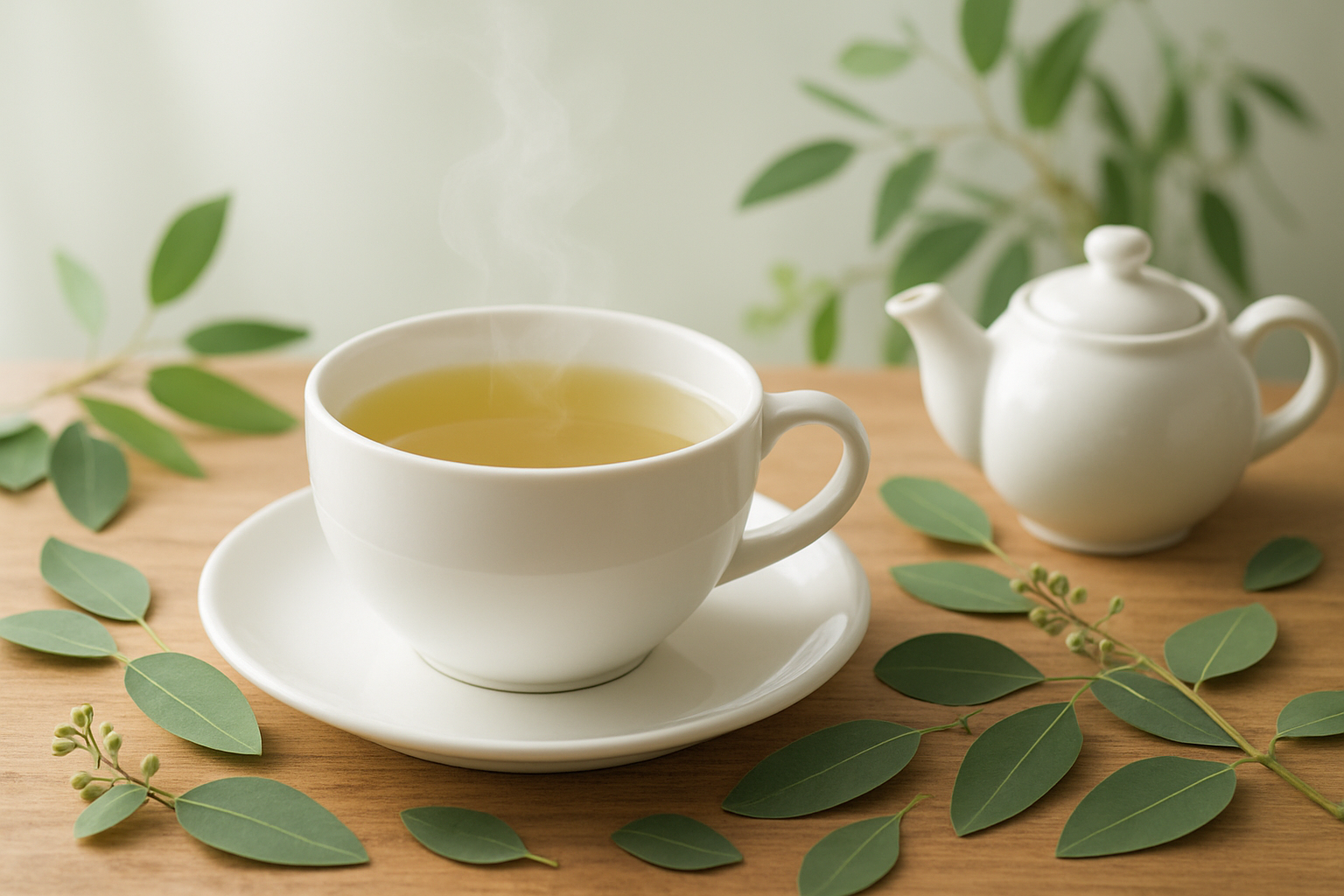
Respiratory System Support and Congestion Relief
Eucalyptus tea shines brightest when it comes to breathing easier. The eucalyptol compound, which makes up about 70% of eucalyptus oil, works like a natural decongestant that helps break up stubborn mucus in your airways. When you sip warm eucalyptus tea, those aromatic vapors travel directly to your respiratory system, providing relief from chest congestion, sinusitis, and seasonal stuffiness.
People dealing with bronchitis often find eucalyptus tea helpful because it loosens phlegm and makes coughing more productive. The warm steam combined with the natural expectorant properties creates a double effect – the heat soothes irritated throat tissues while the eucalyptol helps clear blocked passages.
Even those with asthma symptoms report feeling less tightness in their chest after drinking eucalyptus tea regularly, though this shouldn’t replace prescribed medications. The anti-spasmodic qualities help relax the smooth muscles in your airways, making breathing feel less labored.
Anti-inflammatory Properties for Joint and Muscle Health
Your aching joints and sore muscles get a break when you drink eucalyptus tea regularly. The powerful anti-inflammatory compounds work from the inside out, reducing swelling and pain throughout your body. Athletes and people with arthritis particularly appreciate these benefits.
The tea contains flavonoids and tannins that help calm inflammation at the cellular level. This means less morning stiffness for arthritis sufferers and faster recovery times for people who exercise regularly. Many folks notice reduced joint pain after drinking eucalyptus tea for a few weeks.
Muscle tension also responds well to eucalyptus tea consumption. The natural compounds help relax muscle fibers and improve blood flow to affected areas, which speeds up healing and reduces discomfort.
Immune System Strengthening Effects
Your immune system gets a solid boost from eucalyptus tea’s antioxidant arsenal. The tea contains high levels of vitamin C, quercetin, and other protective compounds that help your body fight off infections and recover faster from illness.
Regular tea drinkers often notice they catch fewer colds and bounce back quicker when they do get sick. The antioxidants neutralize harmful free radicals that can weaken your immune defenses, while the antimicrobial properties create an environment that’s hostile to invading pathogens.
White blood cell activity increases when you consume eucalyptus tea consistently, giving your body’s natural defense system the extra ammunition it needs to stay strong year-round.
Antimicrobial Benefits for Fighting Infections
Bacteria, viruses, and fungi don’t stand much chance against eucalyptus tea’s natural antimicrobial arsenal. The eucalyptol and other terpenoids create an environment where harmful microorganisms struggle to survive and multiply.
Studies show eucalyptus compounds effectively combat common bacteria like E. coli and Staphylococcus aureus, making it useful for preventing minor infections. The tea also shows promise against certain viral strains, which explains why many people reach for eucalyptus tea when they feel something coming on.
Fungal infections, including candida overgrowth, also respond to eucalyptus tea consumption. The natural antifungal properties help restore balance to your body’s microbiome without disrupting beneficial bacteria.
Digestive Health Improvement
Your digestive system benefits from eucalyptus tea’s soothing and anti-inflammatory properties. The tea helps calm stomach irritation, reduces bloating, and can ease symptoms of indigestion after heavy meals.
People with gastritis or stomach ulcers often find eucalyptus tea gentler on their digestive tract compared to other herbal teas. The anti-inflammatory compounds help heal irritated stomach lining while the mild antiseptic properties keep harmful bacteria in check.
Gas and bloating decrease for many people who drink eucalyptus tea regularly, thanks to its carminative properties that help expel trapped air from the digestive tract. The tea also stimulates healthy digestion by promoting better enzyme production and nutrient absorption.
Potential Risks and Safety Considerations

Toxic Compounds and Safe Consumption Limits
Eucalyptus leaves contain eucalyptol (also known as 1,8-cineole), which gives the plant its distinctive aroma and therapeutic properties. While beneficial in small amounts, this compound becomes toxic at higher concentrations. The tannins present in eucalyptus can also cause digestive upset when consumed excessively.
Safe consumption typically means drinking no more than 1-2 cups of eucalyptus tea per day, and only for short periods (7-10 days maximum). Commercial eucalyptus teas are generally formulated to contain safe levels of active compounds, but homemade preparations from fresh leaves pose greater risks due to unpredictable concentrations.
Warning signs of eucalyptus toxicity include:
- Nausea and vomiting
- Diarrhea
- Dizziness
- Muscle weakness
- Difficulty breathing
Drug Interactions and Medical Contraindications
Eucalyptus tea can interfere with several medications and medical conditions. The active compounds may affect how your liver processes certain drugs, potentially altering their effectiveness or increasing side effects.
Key interactions to watch for:
| Medication Type | Potential Interaction |
|---|---|
| Diabetes medications | May enhance blood sugar-lowering effects |
| Blood pressure medications | Could amplify hypotensive effects |
| Sedatives | May increase drowsiness |
| Liver-processed drugs | Can alter medication metabolism |
People with liver disease, kidney problems, or digestive disorders should avoid eucalyptus tea entirely. Those with low blood pressure need to be especially cautious, as eucalyptus can cause further drops in blood pressure.
Side Effects for Sensitive Individuals
Some people experience adverse reactions even with normal consumption amounts. Common side effects include stomach irritation, heartburn, and allergic reactions manifesting as skin rashes or respiratory issues.
Individuals with sensitive stomachs often report cramping and loose stools after drinking eucalyptus tea. Those with asthma or respiratory conditions might experience paradoxical worsening of symptoms, despite eucalyptus’s reputation as a respiratory aid.
Red flags requiring immediate medical attention:
- Severe allergic reactions (difficulty breathing, swelling)
- Persistent vomiting
- Chest pain or irregular heartbeat
- Severe abdominal pain
Pregnancy and Breastfeeding Precautions
Pregnant and breastfeeding women should completely avoid eucalyptus tea. The active compounds can cross the placental barrier and appear in breast milk, potentially affecting fetal development or infant health.
During pregnancy, eucalyptus consumption has been linked to increased risk of miscarriage and developmental issues. The volatile oils can stimulate uterine contractions, making it particularly dangerous during the first trimester.
Breastfeeding mothers who consume eucalyptus products may pass toxic compounds to their infants through breast milk. Babies are especially vulnerable to eucalyptus toxicity due to their developing nervous systems and smaller body size.
Even topical eucalyptus products should be used with extreme caution during these periods, as skin absorption can still introduce compounds into the bloodstream.
Practical Uses Beyond Drinking
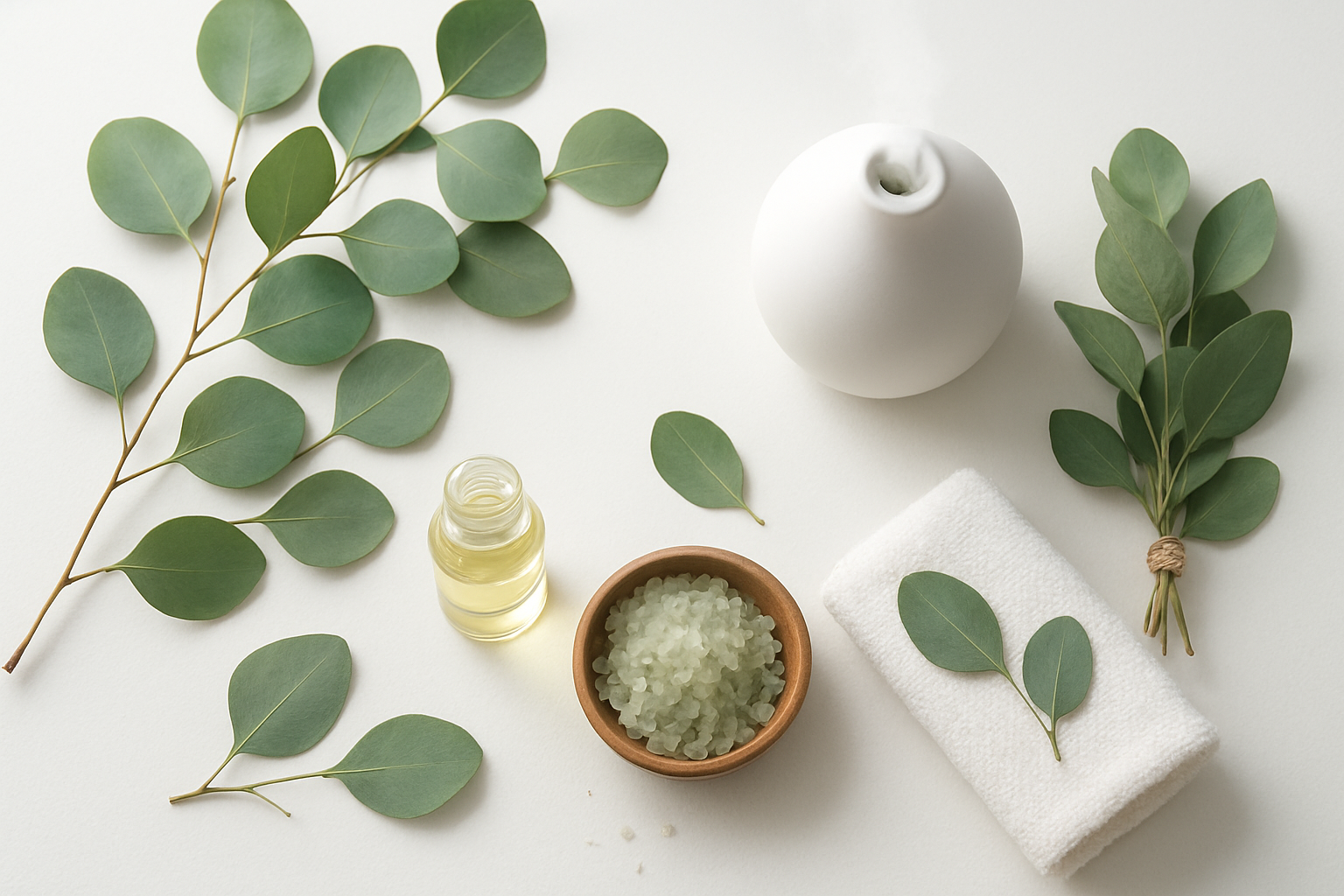
Aromatherapy and Steam Inhalation Benefits
The aromatic compounds in eucalyptus tea create powerful therapeutic effects when used for inhalation purposes. When you brew a strong cup of eucalyptus tea and inhale the steam, the volatile oils containing cineole and other active compounds directly reach your respiratory system. This method works exceptionally well for clearing congested sinuses, opening blocked nasal passages, and soothing irritated throat tissues.
Creating a simple steam inhalation treatment requires steeping 2-3 eucalyptus tea bags in hot water, then leaning over the bowl with a towel draped over your head. The concentrated vapors help break down mucus and reduce inflammation in your airways. Many people find this approach more effective than drinking the tea alone, especially during cold and flu season.
For aromatherapy purposes, you can use cooled eucalyptus tea in a spray bottle to mist your bedroom or workspace. The refreshing scent helps improve mental clarity and creates an energizing atmosphere. Some practitioners add the cooled tea to diffusers or humidifiers for continuous aromatic benefits throughout the day.
Topical Applications for Skin Conditions
Cooled eucalyptus tea serves as an excellent natural remedy for various skin issues. The anti-inflammatory and antimicrobial properties make it particularly useful for treating minor cuts, scrapes, and insect bites. Simply soak a clean cloth in strong, cooled eucalyptus tea and apply it as a compress to affected areas for 10-15 minutes.
For acne-prone skin, eucalyptus tea works as a gentle toner when applied with cotton pads. The natural astringent qualities help reduce oil production while the antimicrobial compounds fight bacteria that contribute to breakouts. Regular use can help minimize pore size and improve overall skin texture.
People dealing with eczema or dermatitis often find relief by adding strong eucalyptus tea to their bath water. The soothing compounds help reduce itching and inflammation while promoting healing. You can also freeze eucalyptus tea in ice cube trays and use these cubes to provide cooling relief for sunburned or irritated skin.
For foot care, soaking tired feet in a basin of warm eucalyptus tea helps eliminate odors, reduce swelling, and soften rough skin. The antifungal properties make it particularly beneficial for preventing athlete’s foot and other fungal infections.
Natural Household Cleaning Applications
Strong eucalyptus tea doubles as an effective, chemical-free cleaning solution for various household tasks. The natural antimicrobial properties make it excellent for wiping down kitchen counters, bathroom surfaces, and other areas prone to bacterial growth. Mix cooled, concentrated eucalyptus tea with white vinegar in equal parts for enhanced cleaning power.
This natural cleaner works particularly well for removing grease and grime from stovetops and range hoods. The degreasing properties of eucalyptus compounds break down stubborn residues without harsh chemicals. Many people prefer this approach over commercial cleaners, especially in food preparation areas.
For floor cleaning, add a cup of strong eucalyptus tea to your mop bucket along with your regular cleaning solution. The added antimicrobial boost helps eliminate germs while leaving behind a fresh, clean scent. This combination works well on tile, hardwood, and laminate flooring.
Eucalyptus tea also serves as a natural air freshener when sprayed around the house. Unlike synthetic air fresheners that mask odors, eucalyptus tea actually neutralizes odor-causing bacteria. The spray works particularly well in bathrooms, laundry rooms, and pet areas where odors tend to linger.
How to Properly Prepare and Consume Eucalyptus Tea
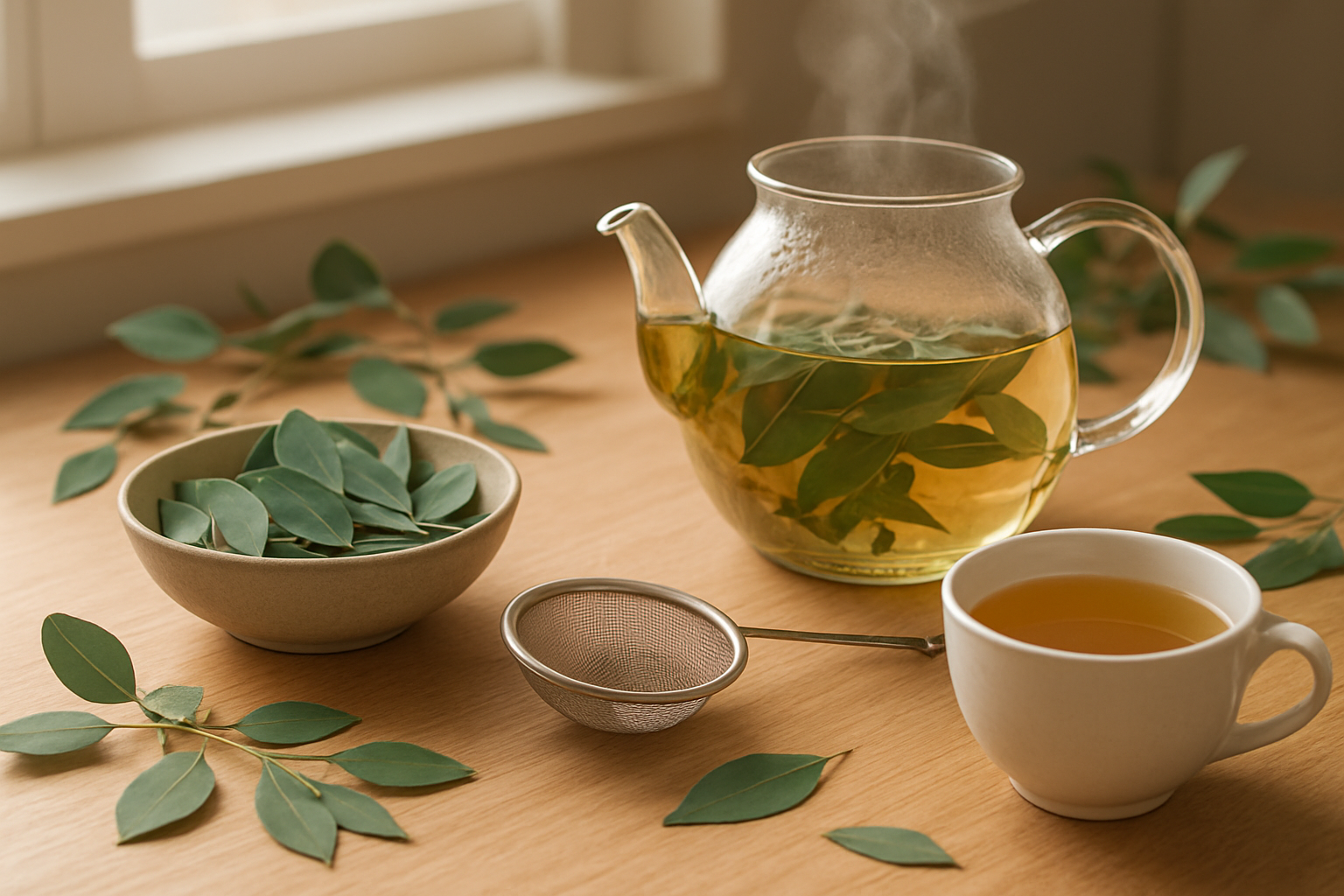
Selecting Quality Eucalyptus Leaves and Products
The quality of your eucalyptus tea starts with choosing the right leaves. Fresh eucalyptus leaves work best, but dried versions are more widely available and convenient. When shopping for dried eucalyptus leaves, look for ones that still retain their natural green-gray color and have a strong, camphor-like aroma. Avoid leaves that appear brown, brittle, or smell musty.
Organic certification matters here since eucalyptus trees can absorb environmental contaminants. Check that the packaging clearly states “food grade” or “culinary use” – not all eucalyptus products are meant for consumption. Some are intended for aromatherapy or topical applications only.
Eucalyptus globulus is the most common species used for tea, though Eucalyptus radiata offers a gentler flavor profile. Pre-made eucalyptus tea bags provide convenience but often contain lower-quality leaf fragments. Whole leaves or coarsely chopped versions typically deliver better flavor and therapeutic compounds.
Store your eucalyptus leaves in an airtight container away from direct sunlight. Properly stored dried leaves maintain their potency for up to two years, while fresh leaves should be used within a few days of purchase.
Optimal Brewing Techniques for Maximum Benefits
Water temperature plays a crucial role in extracting eucalyptus’s beneficial compounds without creating an overly bitter brew. Heat water to just below boiling point – around 190-200°F (88-93°C). Boiling water can destroy delicate essential oils and create a harsh taste.
Use approximately one teaspoon of dried eucalyptus leaves per cup of water. If using fresh leaves, double this amount since they contain more moisture. Place the leaves in a tea infuser or strain them after brewing.
Steeping time directly affects both flavor and therapeutic benefits:
| Steeping Time | Result |
|---|---|
| 3-5 minutes | Mild flavor, gentle effects |
| 5-7 minutes | Balanced taste, moderate benefits |
| 8-10 minutes | Strong flavor, maximum extraction |
| Over 10 minutes | Bitter, potentially harsh |
Cover your cup or teapot while steeping to prevent the essential oils from evaporating. The steam that condenses on the lid contains valuable volatile compounds that enhance the tea’s effectiveness.
Recommended Dosage and Frequency Guidelines
Moderation is key with eucalyptus tea due to its potent active compounds. Start with one cup per day to assess your body’s response. Most adults can safely consume 1-2 cups daily, but this varies based on individual sensitivity and health conditions.
Daily consumption guidelines:
- Beginners: 1/2 to 1 cup daily
- Regular users: 1-2 cups daily
- Maximum safe limit: 3 cups daily (for healthy adults)
Pregnant women, nursing mothers, and children under 12 should avoid eucalyptus tea entirely. People with liver conditions, gastroesophageal reflux, or those taking certain medications should consult healthcare providers before regular consumption.
Take breaks from daily consumption every few weeks to prevent your body from building tolerance to eucalyptus’s effects. A good pattern involves drinking eucalyptus tea for 2-3 weeks, then taking a week off.
Time your consumption strategically – morning cups can help with respiratory congestion, while evening servings might interfere with sleep due to eucalyptus’s stimulating properties.
Flavor Enhancement and Blending Options
Eucalyptus tea’s intense, medicinal flavor benefits from thoughtful additions. Honey is the most popular sweetener since it complements eucalyptus’s therapeutic properties while mellowing the camphor notes. Raw honey works particularly well for respiratory benefits.
Popular flavor combinations:
- Lemon and ginger: Boosts immune support and adds citrus brightness
- Peppermint: Creates a cooling, doubly refreshing mint blend
- Chamomile: Balances eucalyptus’s intensity with gentle, floral notes
- Green tea: Provides antioxidants while moderating eucalyptus strength
Create custom blends by mixing eucalyptus with other herbs during brewing. Use a 1:1 ratio for mild herbs like chamomile, or 2:1 (eucalyptus to other herb) for stronger additions like peppermint.
Fresh citrus slices, particularly lemon or lime, add vitamin C and help mask eucalyptus’s medicinal taste. A small piece of fresh ginger root enhances digestive benefits and provides warming spice.
For cold preparations, eucalyptus makes an refreshing iced tea when combined with mint and lemon. Brew double-strength, cool completely, then serve over ice with fresh herbs as garnish.
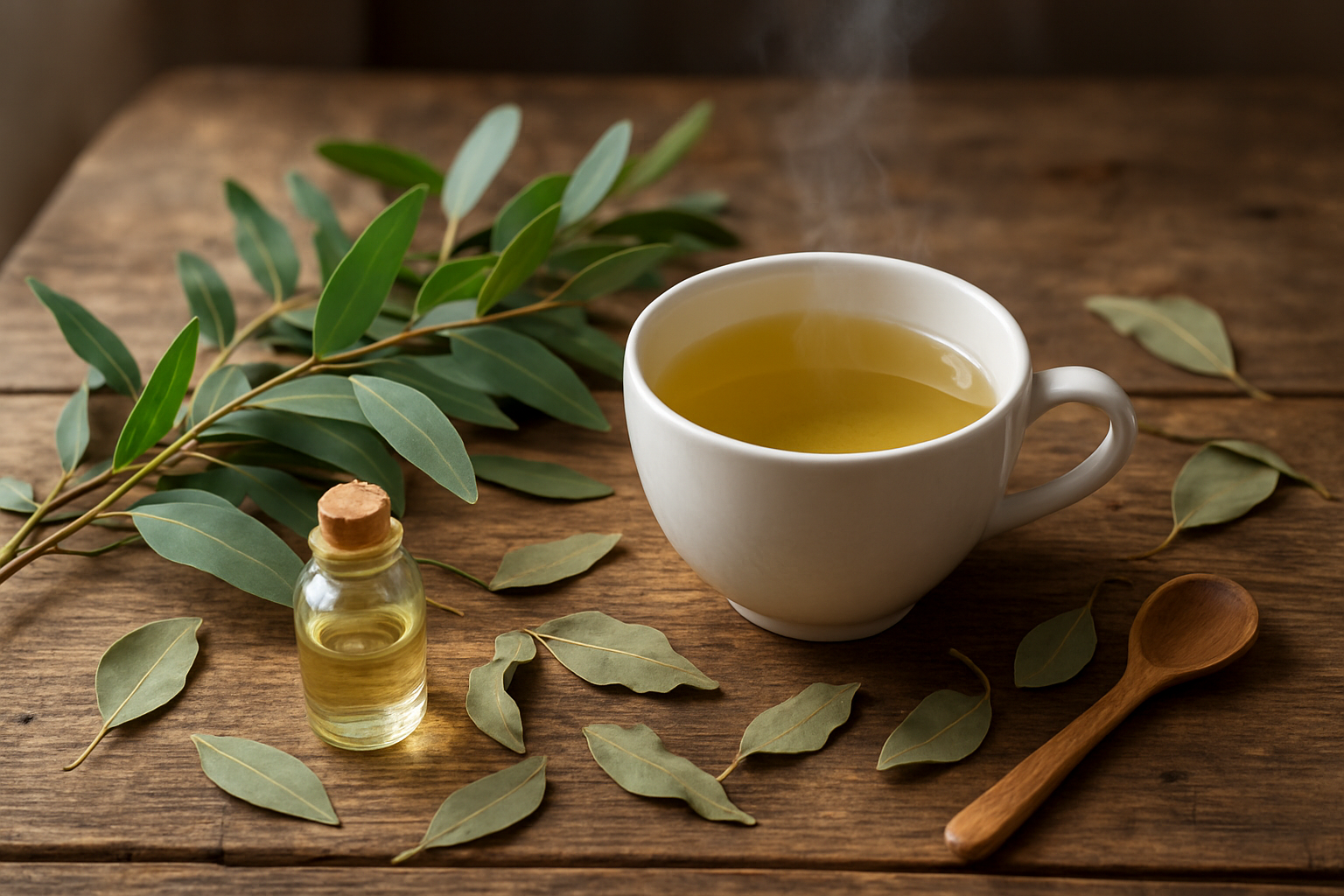
Eucalyptus tea offers a unique blend of health benefits that make it worth considering for your wellness routine. From its ability to ease respiratory issues and reduce inflammation to its antimicrobial properties, this aromatic herbal tea can be a valuable addition to natural health practices. Just remember that moderation is key – stick to recommended amounts and avoid it if you’re pregnant, breastfeeding, or have certain health conditions.
Beyond sipping it as a soothing beverage, eucalyptus tea can serve multiple purposes around your home. Whether you’re using it as a steam inhalation for congestion, creating a natural cleaning solution, or enjoying its aromatherapeutic benefits, this versatile herb extends its usefulness far beyond the teacup. Start with small amounts, prepare it properly, and listen to your body’s response to make the most of what eucalyptus tea has to offer.

